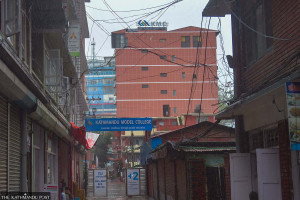Money
Tax breaks promised to factories set up in SEZ
Factories established in Special Economic Zones (SEZ) will get special treatment with respect to tax and fees.
Sanjeev Giri
According to the SEZ bill, industries set up inside the SEZ will not have to pay income tax for five years from the date they start commercial production. They will then get a 50 percent income tax exemption for the next 10 years if at least 60 percent of the raw materials they have used are of domestic origin. Companies not meeting this requirement will get a 50 percent tax waiver for the next five years.
As per the proposed act, industries set up inside SEZs located in mountainous and hilly regions will get an income tax waiver for 10 years from the date of commercial operation. After that, these industries will get a 50 percent waiver on income tax for another 10 years.
Similarly, the SEZ bill states that industries established in the SEZ will get a full waiver on income tax applicable on dividends for a period of five years from the date of beginning commercial operation. At the end of this period, there will be a 50 percent waiver on income tax.
The SEZ bill has stated that the government can relocate any factory in the SEZ by publishing a notice in the Nepal Gazette. However, they will not be eligible to get the benefits mentioned in the act.
According to the bill, 0 percent valued added tax will be applicable on the goods and services exported by the industries located in the SEZ. The provision will also be applicable on raw materials sold to industries operating in the SEZ. However, if there is no export, the facility will not be provided.
The government can waive customs duty and offer other facilities on raw materials, side raw materials, packaging items and other materials required for readymade goods production which are intended for export. The government can also waive customs duty while importing plant, machinery equipment, tools, spare parts and up to three vehicles based on the size and nature of the industry.
If any importer sells goods to industries operating in the SEZ on which customs duty has been paid, the importers will be refunded the amount paid to the extent fixed by the government. If an industry operating outside the SEZ sells goods to the industries established within the SEZ, such transactions will be considered as export and facilities will be provided accordingly.
Local taxes will not be applicable on the movement of vehicles (up to three) used to import plants, carry machinery equipment, tools and spare parts. Likewise, land space and building utilized by the industries established in the SEZ will get 50 percent, 40 percent and 25 percent waiver on the lease charge for the first, second and third years.
According to Pashupati Murarka, officiating president of the Federation of Nepalese Chambers of Commerce and Industry (FNCCI), the apex body of the country’s private sector has put forward two major demands. One, there should be no tax while importing machinery and raw materials by a industry operating in the SEZ. Two, the SEZ Act should have a clear-cut provision regarding provisions against strikes.
“The government provides customs and tax rebates to export-oriented industries. But since there is a long procedure for this, we want the tax not to be charged instead of being refunded later,” Murarka said.
Likewise, he added that since timely delivery of goods plays a crucial role in export-oriented industries, the act should be specific regarding the provision of not holding strikes within the SEZ.
In the absence of laws, the first SEZ of the country located in Bhairahawa has received a cool response from the
private sector. Only 12 companies have applied to set up factories at the country’s first such dedicated area for industrial operation. The private sector is hopeful that the Bhairahawa SEZ will become more attractive after the act comes in force.
“If the act does not incorporate the feelings of the private sector, there won’t be a big change. However, the situation won’t remain the same as it is today,” Murarka said.
The Ministry of Industry has stated that it will table the SEZ bill at the upcoming session of Parliament. “The SEZ Act is being introduced with the aim of expediting the country’s economic development by promoting exports,” said Industry Minister Mahesh Bahadur Basnet, adding that several incentives had been included in the act to woo potential investors.




 26.2°C Kathmandu
26.2°C Kathmandu

















